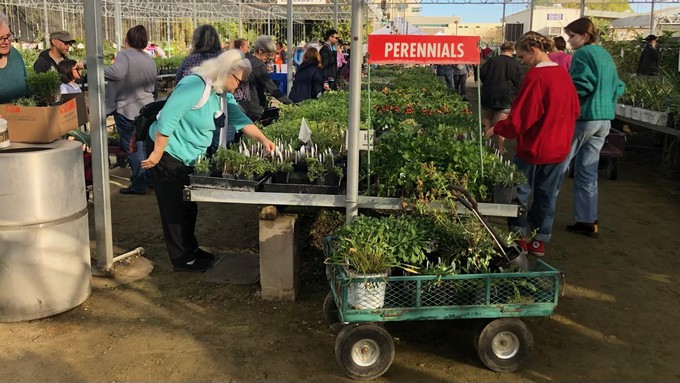
First of four sales features huge selection of water-wise plants

As with the sales last fall, expect plenty of plants and plenty of plant-buyers during the first spring sale at the UC Davis Arboretum Teaching Nursery. Kathy Morrison
At the UC Davis Arboretum, “Friends” get first dibs on new plants.
On Saturday, March 11, the Arboretum Teaching Nursery hosts the first of its 2023 spring sales. But this kickoff event is open only to Friends of the Arboretum, its longtime support group of volunteers and donors.
Say the organizers, “At this members-only event, Friends members are invited to shop before we open the nursery to the public. In addition to the opportunity to shop our best selection and 10% off their purchases, friends members also receive a $10-value member appreciation gift.”
Not a Friend? No problem. New Friends can join at the gate or in advance online here.
Sale hours are 9 a.m. to 1 p.m. Saturday at the Arboretum Teaching Nursery, located on Garrod Drive near UCD’s small animal veterinary teaching hospital on the university campus.
Before the event, prospective shoppers can check out the plant list and photos on the arboretum’s website at https://arboretum.ucdavis.edu/plant-sales.
This year’s inventory features hundreds of varieties of water-wise perennials, shrubs, bulbs, ground covers and trees – all proven to love growing in the Central Valley. That includes California natives as well as plants from other Mediterranean climates.
Featured are the ever-popular Arboretum All-Stars – tough, easy-care, low-water flowering plants with added benefits. Many of these plants attract birds, bees, butterflies and other pollinators while adding beauty to our suburban landscapes.
Besides browsing the arboretum’s inventory online, shoppers also can see many featured varieties growing in the nursery’s demonstration gardens.
Upcoming public sales are scheduled for April 8 (starting at 11 a.m.; Friends get first look at 9 a.m. that day) and 9 a.m. to 1 p.m. April 29; the spring clearance sale is May 13.
Details and directions: https://arboretum.ucdavis.edu.
Comments
0 comments have been posted.Sacramento Digs Gardening to your inbox.
Food in My Back Yard Series
May 6: Maintain soil moisture with mulch for garden success
April 29: What's (already) wrong with my tomato plants?
April 22: Should you stock up on fertilizer? (Yes!)
April 15: Grow culinary herbs in containers
April 8: When to plant summer vegetables
April 1: Don't be fooled by these garden myths
March 25: Fertilizer tips: How to 'feed' your vegetables for healthy growth
March 18: Time to give vegetable seedlings some more space
March 11: Ways to win the fight against weeds
March 4: Potatoes from the garden
Feb. 25: Plant a fruit tree now -- for later
Feb. 18: How to squeeze more food into less space
Feb. 11: When to plant? Consider staggering your transplants
Feb. 4: Starting in seed starting
Sites We Like
Garden Checklist for week of May 11
Make the most of the lower temperatures early in the week. We’ll be back in the 80s by Thursday.
* Plant, plant, plant! It’s prime planting season in the Sacramento area. Time to set out those tomato transplants along with peppers and eggplants. Pinch off any flowers on new transplants to make them concentrate on establishing roots instead of setting premature fruit.
* Direct-seed melons, cucumbers, summer squash, corn, radishes, pumpkins and annual herbs such as basil.
* Harvest cabbage, lettuce, peas and green onions.
* In the flower garden, direct-seed sunflowers, cosmos, salvia, zinnias, marigolds, celosia and asters. (You also can transplant seedlings for many of the same flowers.)
* Plant dahlia tubers.
* Transplant petunias, marigolds and perennial flowers such as astilbe, columbine, coneflowers, coreopsis, dahlias, rudbeckia and verbena.
* Keep an eye out for slugs, snails, earwigs and aphids that want to dine on tender new growth.
* Feed summer bloomers with a balanced fertilizer.
* For continued bloom, cut off spent flowers on roses as well as other flowering plants.
* Add mulch to the garden to maintain moisture. Mulch also cuts down on weeds. But don’t let it mound around the stems or trunks of trees or shrubs. Leave about a 6-inch-to-1-foot circle to avoid crown rot or other problems.
* Remember to weed! Pull those nasties before they set seed.
* Water early in the day and keep seedlings evenly moist.